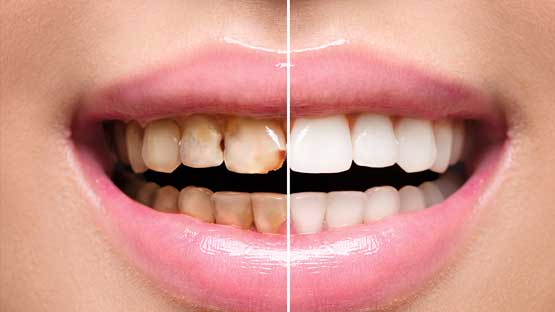full mouth rehabilitation
- Home
- Full Mouth Rehabilitation

full-mouth reconstruction is planned along with an increase in vertical dimension, esthetic inlay or only restorations can be sequenced according to urgency of need. As with all adhesive restorations, if the patient is undergoing bleaching, a minimum of 2 to 3 weeks should pass before one proceeds to restoring the teeth. The timing of inlays and onlays versus other restorative services is determined on a case-by-case basis. Although patients are often eager to proceed with anterior esthetic improvements, they need to understand that restored stability in the posterior is critical to the durability and longevity of any cosmetic anterior service.
Who Requires a Full Mouth Reconstruction?
There are a number of people who have dental problems throughout their mouths that must be treated comprehensively with a vision of a final result that improves both function and esthetics. These patients may exhibit multiple missing teeth, numerous teeth with large fillings that are failing or exhibiting decay, cracked or broken teeth, or badly worn teeth due to bruxism (teeth grinding) or other habits.
There is also a group of patients who were born with conditions such as Ectodermal Dysplasia, Ameliogenesis, or Dentinogenisis Imperfecta that will need extensive restoration of their teeth. These patients may be candidates for a full mouth reconstruction.
Treatment Options for a Full Reconstruction
What happens when a patient wants a full mouth reconstruction procedure? Because it is an extensive dental procedure that involves a variety of cosmetic and restorative treatments, you can’t schedule a full mouth reconstruction in a single appointment. The procedure is part of an approved and recommended course of treatments suggested by Dr. Elena C. Puig after examination and assessment of your oral health and medical history. During a first appointment, Dr. Puig will consider the most suitable procedures to improve your full mouth health, preserve your overall health, restore your smile strength and appearance, and protect essential mouth-related functions. As a result, each full mouth reconstruction procedure is customized to the individual needs of the patient.
Reasons to get a full mouth reconstruction
Many people struggle with tooth conditions such as damaged teeth, severe decay, or tooth loss. Fortunately, there are solutions for even the most serious problems. People who suffer from these challenges should not have to live with embarrassment any longer. Getting reconstructive mouth surgery and other treatments can improve a person’s self-esteem and self-image. It is also much less difficult to enjoy a well-balanced diet. Repairing oral health and cosmetic dysfunctions can prevent larger issues from occurring.
Disadvantages of a Full Mouth Rehabilitation Using Implant or Tooth Supported Combinations
The biggest disadvantage of a full mouth rehabilitation is the amount of time involved. The procedure, from start to finish, could take several months to complete. Some patients are unable to commit to this amount of time.
For a full mouth rehabilitation using implant or tooth supported combinations, other disadvantages may include:
- Amount of planning – full mouth rehabilitations take an extensive amount of planning both on the part of the Prosthodontist and the patient.
- Cost – treatment costs can range from several hundred to several thousand dollars.
- Recovery time – implant procedure recovery time can take several months.
- Chance of failure – if not properly maintained the implant procedure may fail.
- Multiple appointments – a full mouth rehabilitation will require multiple dental appointments.

